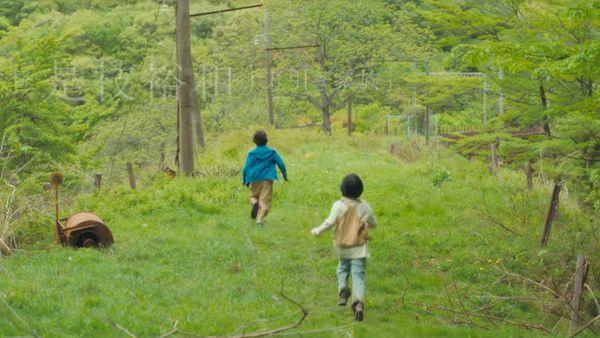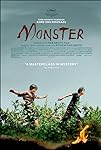Eye For Film >> Movies >> Monster (2023) Film Review
Monster
Reviewed by: Jennie Kermode

When a large building catches fire, everybody stops to look. It’s such a dramatic sight that it pulls us, temporarily, out of the everyday, reminding us of a bigger reality. There’s a sense of threat in the way that Hirokazu Kore-eda films it, even though we are observing from a distance, as if it signifies the encroachment of a larger catastrophe. The mother and son beside us are about to be overwhelmed by events that neither of them fully understand, and the later arrival of a dramatic weather event serves to remind us of the existential threat against which all our individual stories are now playing out – yet Monster, surprisingly, will emerge as a film full of hope.
The mother, Saori (Sakura Ando) is a widow and has devoted herself to creating a good life for her 11-year-old son Minato (Sōya Kurokawa). When his behaviour suddenly changes, becoming sullen and aggressive, she’s concerned. Is this just the beginning of adolescence, or something else? After a particularly extreme incident, she confronts him, and learns that one of his teachers, Mr Hori (Eita Nagayama), has told him that he is a bad person with the brain of a pig. It’s the sort of remark that an adult might brush off but that has evidently disturbed this sensitive boy. Why would a teacher do a thing like that?
Inevitably attracting comparisons with Rashomon – though it does what it does for different reasons – Monster is a film in three parts, showing us fragments of the same series of events from the perspectives of Saori, Mr Hori, and Minato himself. The difference in how they understand what they see is initially shocking but gradually comes to make sense, encouraging viewers to extend empathy even towards those who seem unforgiveable. Whilst Saori and Mr Hori’s positions differ because of the information to which they have access, Minato’s is still harder for them to connect with because, at his age, he still understands the world in a fundamentally different way. It is this that will lead to the film’s other crisis, when he and his classmate, Yori (Hinata Hiiragi) go missing.
Hirokazu’s choice of locations reflects these differences, the adults’ confrontations taking place in clean, daylit rooms whilst the events most important to Minato take place in darkness, in disordered spaces or in the natural world. There is a conflict here between systems of imposing order on the world and something much more chaotic and animal, the raw experience of a boy who is yet to find a way of reconciling his own nature with the society in which he has been trying to find a place. The superb score by Ryuichi Sakamoto – his final work in film – captures these different perspectives and teases out the complexities of the film’s emotional landscape.
To say much more would be to risk spoiling a film which is as much about the journey as its points of discovery. It’s a beautifully constructed piece of work in which every detail serves the whole, putting the tools of the epic at the disposal of a story which is intimate and delicately realised. With carefully balanced performances and particularly impressive work from the younger cast members, it’s a film you won’t want to miss.
Reviewed on: 04 Feb 2024
















